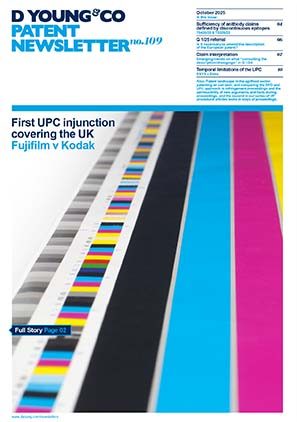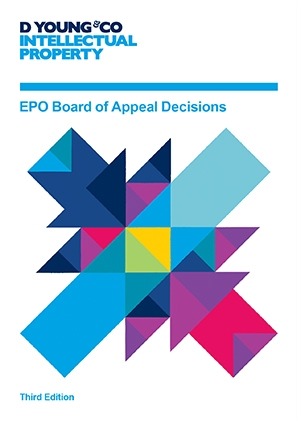EPO examination reports: “will be refused” a substantial procedural violation?
It can be frustrating for applicants to feel arguments and evidence is not being considered by an examiner during the examination process. The right to be heard is enshrined in Article 113 EPC under European patent law. Violating this right is a substantial procedural violation. One of the consequences of a substantial procedural violation is that, under R103(1)(a) EPC, an appeal fee may be reimbursed in full.
In T 1414/18, an appeal decision concerning an examining division decision to refuse patent application EP14178323, the applicant had strong reasons by the end of the examination procedure to feel that any further discussion with the examiner would “not be fruitful”.
A search report was issued on EP14178323 in which the search division held that independent claims 1 and 2 lacked unity and there were two inventions. The applicant paid the second search fee and a full European search report was issued covering both inventions. In the first examination report (this is formally referred to as a communication under Article 94(3)EPC), the examining division agreed with the search division that there was a lack of unity (the examining division also asserted that the claims lacked clarity, were not novel and were not inventive. However, these issues are not central to this decision). In response, the applicant argued there was unity and requested a refund of the second search fee. The examining division then issued a second examination report in which it presented new reasons for the lack of unity. Again the applicant replied presenting further arguments as to why there was unity.
In its third and final examination report, the examining division maintained its lack of unity assertion and pointed out that: “two searches needed to be performed as claim 1 discloses a broad claim relating to scheduling meanwhile claim 2 is restricted to specific features describing overlapping frames. As seen by the documents cited in the search report, two searches were performed and different documents were found.”
The examining division further stated: “The preliminary opinion of the examining division is to refuse the reimbursement of [the search] fee…If [the applicant] so wishes, [the applicant] is invited to request explicitly a separate interlocutory decision on the matter that [the applicant] can later appeal…The next procedural step will be summons to oral proceedings during which the application will be refused (Article 97(2) EPC) [emphasis added]”.
In response, the applicant withdrew their request for oral proceedings and requested an appealable decision according to the state of the written file. The examining division then issued a short decision in which the application was refused. This decision contained a mere reference to the third examination report issued by the examining division. The examining division did not explicitly refuse to refund the second search fee. The applicant filed an appeal requesting the decision be put aside and once again requested reimbursement of the second search fee. The applicant argued that the claims were unified and that they define the process of the invention from two different perspectives.
Findings of the Board of Appeal
The Board of Appeal first considered the question of the unity of the claims and found that the application as a whole consistently referred to a single invention. In particular, it found there was no hint in the application towards using the process independently for a different purpose. The Board of Appeal held that a complete search should not be restricted to the claims of a patent, regardless of how broad or limited they are, but consideration should be given to the description and drawings.
The Board of Appeal considered that independent claims 1 and 2 were unified and set aside the examining division’s decision.
Although the examining division’s decision to refuse the application did not explicitly refer to the request to refund the second search fee, the Board of Appeal found that the examining division’s decision had implicitly refused the request for a refund of the search fee because the examining division’s intent was clear. The Board of Appeal held that since unity of the invention had been incorrectly denied by the examining division, the additional search fee should be refunded.
The Board of Appeal held that the phrase “will be refused” implies that, regardless of any facts or arguments the applicant could potentially have put forward, the application would be finally refused under Article 97(2)EPC. The Board of Appeal further stated that the phrase could not reasonably be understood as indicating “the likely consequence”.
The Board of Appeal held that the applicant would most likely infer from the phrase that any reaction to the substance of the examining division’s communication was pointless since the examining division had apparently already made up its mind on the issues at stake. The Board of Appeal held that this is contrary to the “right to be heard” under Article 113(1)EPC. Consequently, the Board of Appeal considered there had been a substantial procedural violation. Since there was a substantial procedural violation, the Board of Appeal found that reimbursement of the appeal fee was equitable.
The case was then remitted to the examining division for examination of those requirements of patentability which had not yet been assessed. The Board of Appeal declined to comment on these remaining aspects of patentability.
Summary
A statement such as “the next procedural step will be a summons to oral proceedings during which the application will be refused” made prior to a final decision to refuse a patent application is likely to be a substantial procedural violation. A substantial procedural violation can lead to the reimbursement of an appeal fee. Searches should not be restricted to the claims of an application - consideration should be given to the description and drawings.
Practical points
We recommend referring to the description and/or drawings when arguing that there is unity for claims. We also recommend requesting the refund of any additional search fees which are paid. It may be worthwhile reminding the examining division of the right to be heard under Article 113 EPC if it states that the next communication will be a refusal (if it seems the examining division has already made up its mind).
T 1414/18
Link to decisionEP2830381
Link to decision

